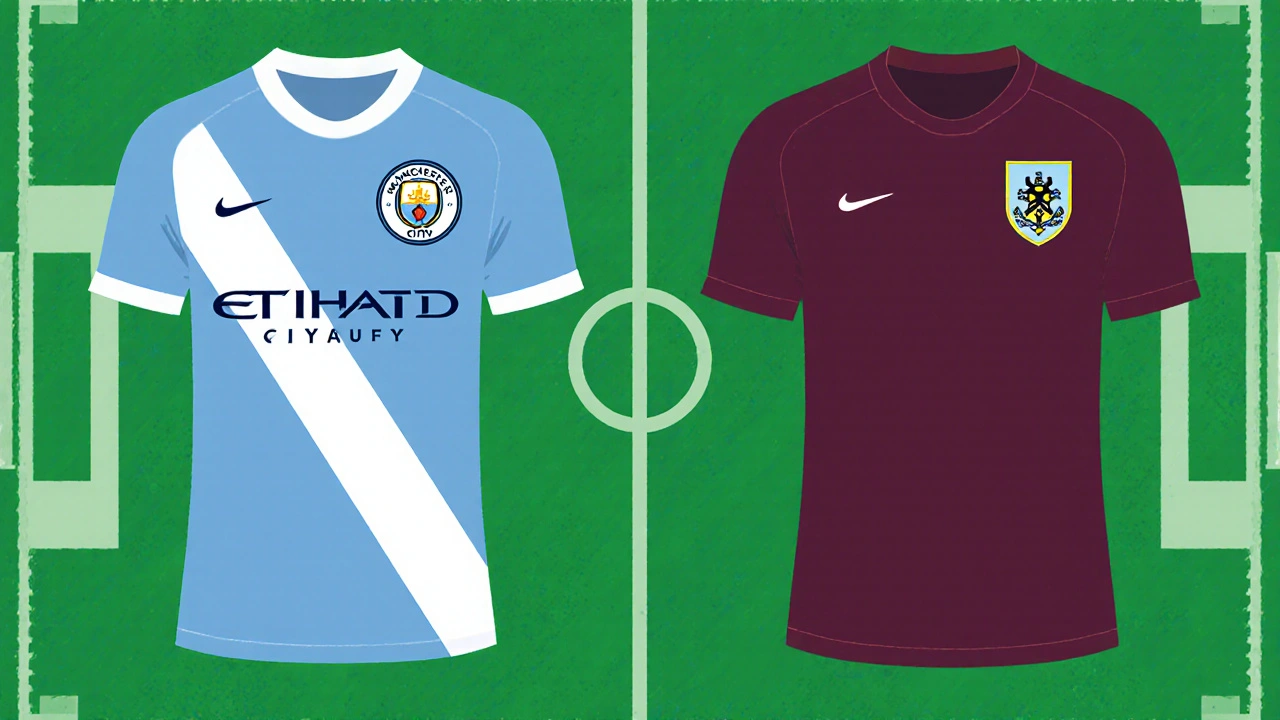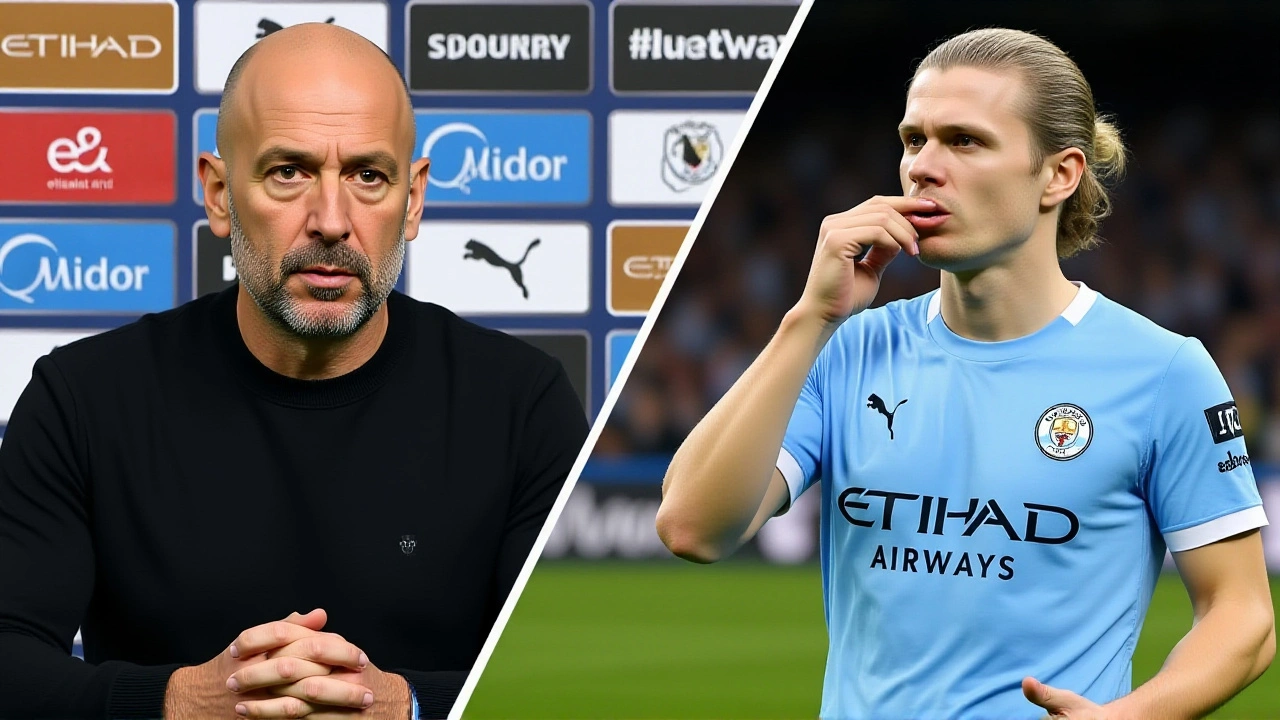Match Overview
At a packed Etihad Stadium, Manchester City turned a tentative opening into a dominant display, cruising to a 5-1 victory over Burnley. The win not only reinforced City’s early‑season momentum but also marked their 14th straight triumph against the Lancashire side – a streak that stretches back over a decade.
The game began with an unfortunate twist for Burnley. Within the first five minutes, centre‑back Maxime Estève attempted a routine clearance that looped back into his own net, handing the hosts an early lead. Burnley, however, showed character and soon equalised when winger Jaidon Anthony slipped the ball past Ederson with a low‑driven effort, restoring parity seven minutes before the break.
Both managers used the halftime interval to adjust tactics. Pep Guardiola urged his side to maintain possession and exploit the wide areas, while Burnley’s coach emphasized compact defending to frustrate City’s attacking rhythm. The second half would prove the decisive phase.

Key Moments and Player Performances
City emerged from the tunnel with renewed intensity. A crisp pass from Kevin De Bruyne found Riyad Mahrez on the left, whose incisive run forced a defensive scramble that resulted in Estève’s second own‑goal – this time from a diagonal ball that slipped past his foot. The double mishap effectively gave Burnley a four‑goal deficit.
With the score line ticking up, City’s forwards began to assert themselves. Phil Foden’s quick one‑two with Bernardo Silva produced a low finish that skimmed past the post, and later, a well‑timed header from John Stones made it 4‑1. Despite the growing deficit, Burnley managed to hold a semblance of shape, limiting City’s clear‑cut chances in the closing minutes.
The drama resurfaced in the 80th minute when Haaland, who had been quiet for most of the match, turned the tide. Picking up a loose ball at the edge of the box, the Norwegian striker’s first goal showcased his instinctive positioning – a swift turn and a precise side‑footed finish past the keeper. Eight minutes later, he capped the night with a second, capitalising on a lofted cross from Jack Grealish; Haaland met the ball with his head, sending it into the top corner. The brace not only underlined his reputation as a clutch performer but also sealed the final 5‑1 scoreline.
Burnley’s solitary goal came late when they capitalised on a rare lapse in City’s defence, with Anthony once again finding the net, albeit too little too late. The match statistics reflected City’s superiority – they held 63% possession, completed over 550 passes, and created more chances, though the final third felt slightly reluctant at times.
Overall, the game highlighted City’s resilience after an uneasy start, their ability to convert set‑piece chaos into scoring opportunities, and Haaland’s knack for delivering when the pressure mounts. For Burnley, the day will be remembered for Estève’s unfortunate errors, but also for their brief fighting spirit that kept the contest alive until the final whistle.

6 Responses
What a show at the Etihad!!! City turned that early wobble into a full‑on onslaught!!! Haaland’s late double was the perfect cherry on top, and those own‑goals were just the icing!!! Can't wait to see them keep the pressure rolling!!!
Burnley fought hard but the gap was just too big.
The match illustrated, in stark terms, the widening gulf between Premier League elites and the struggling provincials. While City strutted across the Etihad with a swagger that could be described as almost regal, Burnley appeared as a hapless ship caught in a tempest of superior talent. The early own‑goal by Estève was not merely a mistake; it was a symptom of a deeper deficiency in composure and preparation. One could argue that Pep Guardiola’s tactical adjustments at halftime were the catalyst that transformed a tentative start into a relentless onslaught. Yet the true narrative lies in the psychological erosion that each subsequent error inflicted upon the Lancashire side. The second own‑goal, orchestrated by a mis‑timed diagonal pass, compounded the humiliation and signaled a near‑total loss of confidence. Phil Foden’s quick exchange with Bernardo Silva, although resulting only in a near‑miss, showcased a fluidity that Burnley simply could not match. John Stones’ header added a fourth, further cementing the notion that defensive frailties had become exposed. When Haaland finally emerged, his brace was not just a demonstration of personal brilliance but a stark reminder of why he is considered a world‑class striker. The first goal, a deft turn and side‑footed finish, was executed with surgical precision, while the second, a perfectly timed header from a Grealish cross, epitomised clinical finishing. Burnley’s solitary response, a late consolation, arrived as a hollow echo in a stadium that had already been conquered. Statistically, a 63% possession total for City reflects a dominance that went beyond mere numbers; it was an exhibition of control, rhythm, and relentless pressure. In contrast, Burnley’s inability to retain shape after the early setbacks delineated a team in disarray. The moral of the story is clear: without a resilient defensive foundation and the mental fortitude to recover from early setbacks, any side is vulnerable to the relentless tide of a top‑tier opponent. This defeat should serve as a harsh but necessary lesson for the Clarets, urging them to reevaluate their tactical approach and to cultivate a stronger, more cohesive unit if they hope to survive in this ruthless competition.
I get why Burnley’s fans felt the sting; an early own‑goal can shatter morale, yet they kept pushing and even got a goal back. City’s class showed in how they recovered, and Haaland’s brace was a testament to his killer instinct. Still, that 63% possession just shows the gap in quality, and it’s a learning curve for the Clarets. Hopefully they’ll tighten up at the back and avoid those costly mistakes next time.
Totally feel you!!! 🎉 City’s fire was unstoppable, and Haaland simply owned the twilight minutes. 🙌
Ah, the lament of the purist! One must admire the artistic chaos of Estève’s blunders-each misstep a brushstroke in the grand canvas of City’s domination. Yet, to dismiss Burnley entirely would be a myopic view; the league thrives on such theatrical contrasts.